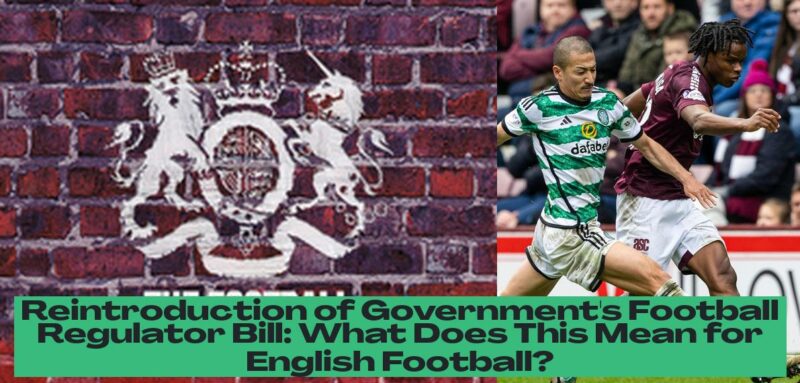Government reintroduces football regulator bill
The world of football, particularly in England, has been abuzz with news of the government’s reintroduction of the Football Governance Bill. This legislation, initially introduced in March 2024, aims to establish an independent body to oversee the financial stability and governance of football clubs in England’s top five tiers. This development comes after the bill failed to pass through parliament before the May general election.
The Labour government, having won the election, has now reintroduced the bill during Wednesday’s King’s Speech, outlining its legislative agenda for the upcoming term. This move signals the government’s commitment to addressing concerns about the financial sustainability and governance of football clubs in England. The bill will empower a regulator, independent of both the government and football authorities, to oversee clubs’ financial practices and ensure their long-term viability.
The government’s stated objective is to “protect football clubs” by “ensuring their financial sustainability.” This emphasis on financial stability is a direct response to the ongoing financial challenges faced by many clubs, particularly those outside the Premier League. The bill’s provisions aim to address the uneven distribution of wealth within the football pyramid, where the Premier League clubs have significantly more financial resources than those in lower divisions. The regulator will have the authority to intervene in instances of financial distress, preventing clubs from collapsing and ensuring a more equitable distribution of resources across the different tiers of English football.
One of the key provisions of the bill is the grant of “backstop powers” to the regulator. These powers will enable the regulator to step in and mediate disputes between the Premier League and the English Football League (EFL), particularly in cases where they fail to reach an agreement on funding distribution. The collapse of talks in March over a proposed “New Deal” between the two organizations highlighted the need for a neutral third party to facilitate negotiations and ensure a fair allocation of funds. The regulator’s role in this context is to act as a mediator and advocate for a more equitable distribution of financial resources, ensuring the sustainability of clubs across all levels of the game.
The reintroduction of the Football Governance Bill has been met with mixed reactions from various stakeholders in the football community. Niall Couper, chief executive of the Fair Game campaign group, has expressed optimism about the government’s commitment to fairer financial distribution, stating that “it is brilliant news to hear the government is firmly committed to delivering a fairer financial distribution at all levels of the football pyramid.” However, he cautioned that “the devil is in the detail,” emphasizing the importance of careful implementation of the bill’s provisions to achieve its intended outcomes.
- The government has reintroduced the Football Governance Bill to establish an independent regulator overseeing financial stability and governance of football clubs in England’s top five tiers.
- The bill aims to address concerns about financial sustainability and governance in English football, particularly focusing on clubs outside the Premier League.
- An independent regulator will have the authority to intervene in cases of financial distress, preventing club collapses and promoting a more equitable distribution of resources across different tiers.
- The bill grants “backstop powers” to the regulator to mediate disputes between the Premier League and English Football League, ensuring fair funding distribution and sustainability for clubs.
- This move reflects the government’s commitment to protecting football clubs by ensuring their long-term financial viability and addressing the wealth disparity within the football pyramid.
The Premier League’s Perspective
The Premier League, representing the top tier of English football, has adopted a cautious stance toward the reintroduction of the bill. The league has stated that it “looks forward” to working with the new government and emphasizes the need for “proportionate and effective” regulation. This cautious approach suggests that the Premier League is wary of excessive intervention by the regulator and is seeking to ensure that the bill’s provisions do not unduly restrict the league’s autonomy.
The Premier League’s position is understandable, given the league’s substantial financial resources and its desire to maintain its status as the most prestigious football league in the world. However, the government’s commitment to addressing the financial imbalances within the football pyramid, particularly between the Premier League and the EFL, suggests that the regulator will have a significant role to play in ensuring a more equitable distribution of resources. The Premier League’s willingness to work with the government on the implementation of the bill suggests that they recognize the importance of collaboration in achieving a sustainable future for English football.
The Premier League’s emphasis on “proportionate and effective” regulation highlights the need for a balanced approach to the regulator’s powers. The regulator must be empowered to address the financial challenges faced by clubs in lower divisions while avoiding unnecessary interference in the Premier League’s operations. This requires a careful balance between ensuring financial stability across the pyramid and respecting the autonomy of the Premier League as a distinct entity.
The EFL’s Perspective
The English Football League (EFL), which comprises the second, third, and fourth tiers of English football, has welcomed the government’s reintroduction of the bill. EFL chairman Rick Parry has stated that “it is clear from the many conversations I have had since the general election result that the football pyramid matters to those inside and outside the game.” This statement reflects the EFL’s desire for a more equitable distribution of resources and their belief that the bill’s provisions will benefit clubs in lower divisions.
The EFL’s perspective is shaped by its experience of financial challenges faced by clubs in the lower tiers. The EFL has long advocated for a more equitable system of revenue sharing, arguing that the current distribution model disadvantages clubs in lower divisions, making it difficult for them to compete financially and on the pitch. The EFL views the bill as a potential solution to these challenges, providing a mechanism for fairer financial distribution and ensuring the long-term viability of clubs in the lower tiers.
The EFL’s support for the bill highlights the importance of addressing the financial disparities within the football pyramid. The government’s commitment to ensuring financial sustainability across all tiers of English football reflects a recognition of the need for a more equitable system. While the Premier League emphasizes the need for proportionate regulation, the EFL emphasizes the importance of empowering the regulator to address the financial challenges faced by clubs in lower divisions.
The Future of Football Governance in England
The reintroduction of the Football Governance Bill marks a significant development in the governance of English football. The bill’s provisions, if implemented effectively, have the potential to address the financial imbalances within the football pyramid and ensure the long-term sustainability of clubs at all levels. The bill’s success will depend on the government’s ability to balance the interests of various stakeholders, including the Premier League, the EFL, and the football fans.
The government’s commitment to establishing an independent regulator is a positive step towards improving the governance of English football. The regulator’s role will be crucial in ensuring a more equitable distribution of resources, promoting financial stability, and fostering a fairer playing field across all tiers of the game. The bill’s implementation will be closely watched by football fans, clubs, and stakeholders alike, as it promises to shape the future of football governance in England.
Considerations for the Future
The reintroduction of the Football Governance Bill has generated significant interest and debate within the football community. While the bill’s objectives are commendable, its implementation will require careful consideration and a nuanced approach to address the complex challenges facing English football. Here are a few key considerations for the future:
- Balancing the Interests of Stakeholders: The regulator will need to navigate the competing interests of various stakeholders, including the Premier League, the EFL, and the fans. Striking a balance between promoting financial sustainability across all tiers and respecting the autonomy of the Premier League will be crucial.
- Ensuring Effective Regulation: The regulator’s powers must be defined clearly and effectively to ensure that it can address the financial challenges faced by clubs while avoiding unnecessary interference in their operations. The regulator’s independence from government and football authorities will be essential for its credibility and effectiveness.
- Transparency and Accountability: The regulator’s actions and decisions must be transparent and accountable to ensure public confidence. Mechanisms for public scrutiny and accountability will be necessary to ensure that the regulator operates fairly and effectively.
- Long-Term Sustainability: The bill’s provisions must be designed to promote long-term financial sustainability across all tiers of English football. This requires addressing the underlying causes of financial imbalances and fostering a more equitable system of revenue distribution.
The reintroduction of the Football Governance Bill presents an opportunity to address the financial challenges facing English football and build a more sustainable and equitable future for the sport. The bill’s success will depend on its careful implementation, taking into account the interests of all stakeholders and ensuring transparency and accountability. The future of English football hangs in the balance, and the decisions made in the coming months will have a lasting impact on the sport’s landscape.









